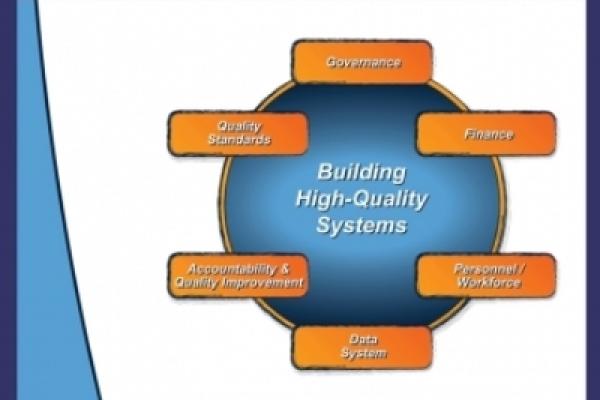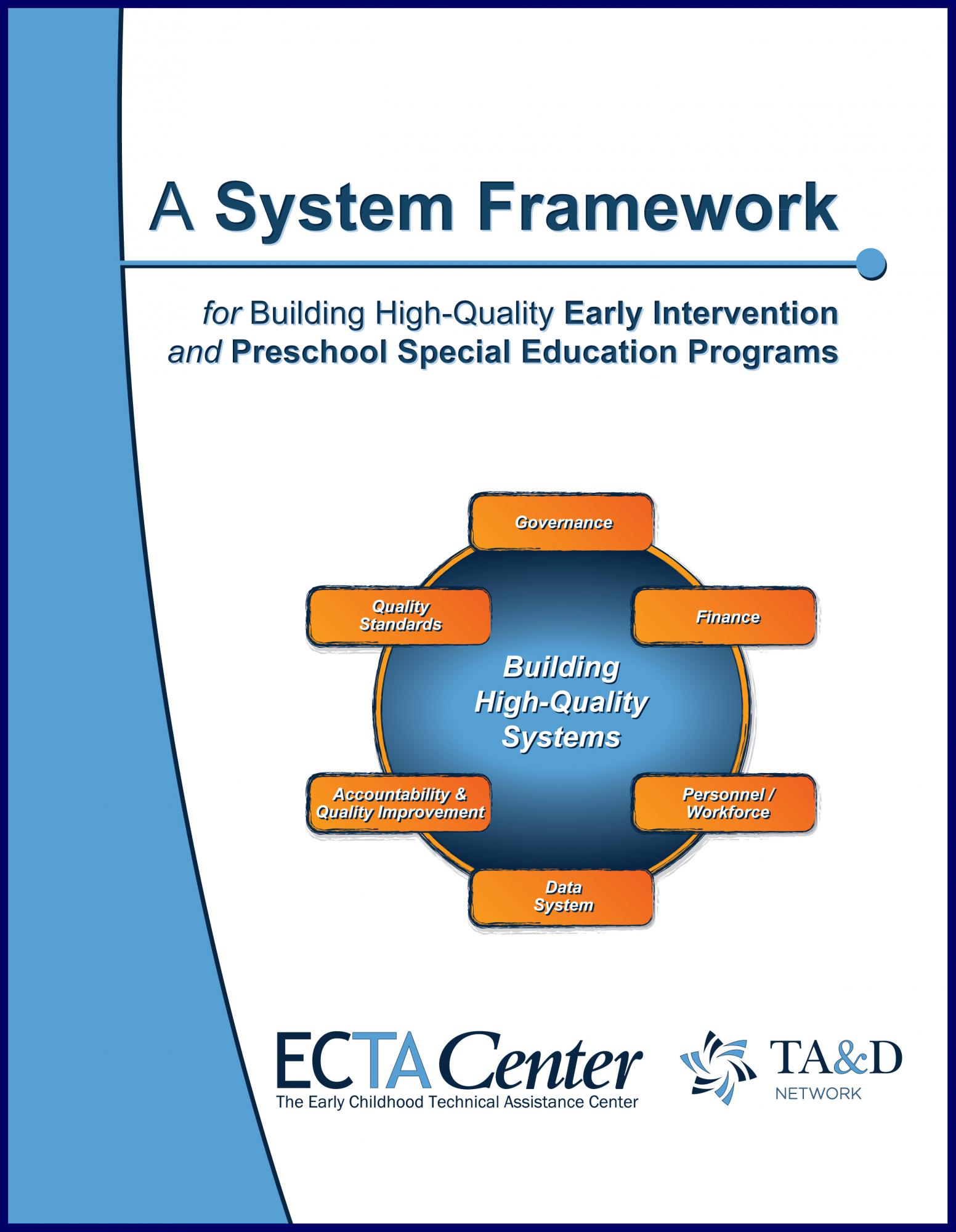
Building High-Quality Systems: The ECTA Center Completes its New System Framework
 from the Spring 2015 issue of Early Developments
from the Spring 2015 issue of Early Developments
They started with a fundamental goal: to identify what a state system needs to put into place to support evidence-based practices for young children with disabilities and their families. Now, after 18 months of development, they have created a comprehensive tool—the System Framework—designed to support states in building and sustaining high-quality early intervention and preschool special education systems.
“Essentially, we wanted to put together the content for states to be able to evaluate their systems and then use that data to plan for improvement,” said Christina Kasprzak, co-director of FPG’s Early Childhood Technical Assistance Center (ECTA Center), which spearheaded the development of the framework. “We wanted to design a tool to help each state fully consider what it means to have a high-quality system.”
Katy McCullough, a TA specialist at the ECTA Center, said that from the initial stages of building the System Framework, the Center kept its eye on the end game: positive outcomes for children with disabilities and families receiving services under Part C and Section 619 of the Individuals with Disabilities Education Act (IDEA).
“We started by asking what actually has to be in place for that to happen?” she said. “The answer: implementation of effective practices. Then, how do we ensure that those will be in place? Well, that’s where the framework comes in.”
According to Kasprzak, early intervention (Part C) and preschool special education (Section 619) state coordinators are the framework’s primary audience. Development of the framework included state coordinators from six partner states and dozens of additional experts and authorities, including core staff at the ECTA Center, other crucial personnel in the partner states, and a technical work group of renowned early childhood professionals.
 “It was a huge team,” said Kasprzak (right). “We wanted to make sure we heard as many voices as possible to help us come to consensus.”
“It was a huge team,” said Kasprzak (right). “We wanted to make sure we heard as many voices as possible to help us come to consensus.”
Many states applied to partner with the ECTA Center to develop and test the framework. In the end, Delaware, Idaho, Minnesota, New Jersey, Pennsylvania, and West Virginia met selection criteria shaped in part by the need to include a representative variety of service delivery systems. Kasprzak explained that states vary significantly in their Part C and Section 619 service delivery systems, but thanks to the representative array of service delivery systems in the partner states and the wide range of expertise providing feedback along the way, the System Framework accommodates such variation.
“States have been very interested in seeing the final version of the System Framework,” she said. “And partner states were eager to be part of the process, getting to have a look at versions of the framework before the rest of the field and having a chance to shape it.”
Kasprzak said the process started with a review of the literature and current research findings, as well as discussions with partner states about what was working in their states and what could be improved. “We asked our partners if they had particular policies in place,” she said. “If their policies were being implemented well. If they were evolving and being revisited, given new knowledge and research.”
 “It was an iterative process,” said McCullough. “Part C and 619 folks were very active. For each component of the system we asked our partner states what they were trying to achieve and what quality meant in their contexts, and along the way we got some nice feedback, validating what we were doing, as well as some really good input that sparked us to revisit draft content.”
“It was an iterative process,” said McCullough. “Part C and 619 folks were very active. For each component of the system we asked our partner states what they were trying to achieve and what quality meant in their contexts, and along the way we got some nice feedback, validating what we were doing, as well as some really good input that sparked us to revisit draft content.”
The ECTA Center and its collaborators organized the System Framework around six interrelated components, each of which is integral to ensuring the implementation of effective practices. The team further developed subcomponents and detailed indicators of quality, in the end providing a multi-layered outline for state Part C and Section 619 programs to address the areas of “governance,” “finance,” “personnel/workforce,” “accountability and quality improvement,” “quality standards”—and “data system.”
“When we began to conceptualize the framework, we landed on several cross-cutting themes,” said McCullough. “Using data for improvement was one of the most important. We want to make sure states are getting the data they need to make good decisions.” Other important cross-cutting themes include: family leadership and support; coordinating or integrating across the broader early childhood service sector; stakeholder engagement; establishing/revising policies; promoting collaboration; and communicating effectively.
Kasprzak and McCullough credited the Center for IDEA Early Childhood Data Systems (DaSy) with developing the framework’s “data system” component. (See Strengthening Capacity of State Data Systems.) The ECTA Center also collaborated closely with the Early Childhood Personnel Center to develop the “personnel/workforce” component and with the Early Childhood Systems Working Group, a group of national leaders supporting the efforts of states to build comprehensive early childhood systems.
In partnership with the DaSy Center, the ECTA Center also has developed a corresponding self-assessment for the framework to assist states as they evaluate their Part C and Section 619 systems to identify strengths and weaknesses, develop plans for improvement, implement those plans, and track improvement.
“We hope that rich conversations will happen in states around the framework content,” Kasprzak said. “States can use the framework and the self-assessment to identify areas for improvement.”
She added that the ECTA Center is compiling a set of resources to accompany the framework and will support states as they use the framework, the self-assessment, and the accompanying resources to improve their service systems—with the ultimate goal of enhancing outcomes for young children with disabilities and their families.
The U.S. Department of Education’s Office of Special Education Programs funded the development of the System Framework.
DS
